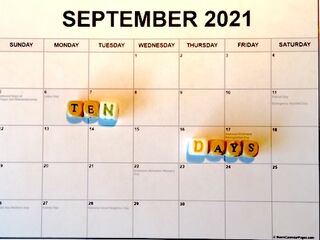Empathy
Ten Days To Get It Right
Ten days of awe and responsiblity.
Posted September 3, 2021 Reviewed by Tyler Woods
Key points
- You've got ten days. Can you reset your life and live your faith?
- What does it mean to live a life of action as well as prayer?
- Are we ready to open our hearts as well as our minds?
- If you had ten days to reset your life and start a new journey, would you?

For the last couple of years, I have been asked to create a writing workshop for the congregants of Temple Beth Or in Raleigh N.C. The initial idea for the first workshop was to give enough direction and support to a group of congregants interested in learning how to write, so they could create personal reflections about the Torah portion of the week and take part in services by presenting their ideas. I should point out that I am an Episcopalian. My husband is Jewish, and we are members of Beth Or.
Church, temple, mosque, cathedral, synagogue—all work for me as a place to slow down and consider life’s mysteries and the power of faith.
In 2019, the workshop was focused on the story of Jonah. I was inspired by my students in that workshop to write my own reflection as a column here, Maybe It’s Time To Jump Off The Sinking Chaos Ship.
This year, I am conducting a two-part workshop titled Ten Days to Get it Right. The first workshop will be on Rosh Hashanah, followed by a second on Yom Kippur, ten days later, both based on traditional as well as modern prayers used during High Holy Days services.
Because I did not grow up attending services at any synagogue, I need to do quite a bit of research and preparation for these workshops, which might be why I enjoy them so much each year. The participating congregants are mostly professionals, many of whom have never taken a writing class or studied literature in college. Beyond the writing, the topics always challenge the participants to reexamine the words and stories they have read and heard, but whose meanings for their lives they might not have truly considered.
My favorite prayer the congregation will use this year is Open the Gates, by Kohenet Ketzirah haMa’agelet. Each line begins with the words, "Open the gates…"
When I first read these words I thought about our doors being closed to the world during the last 18 months, while we worked, zoomed, home-schooled, canceled vacations and holidays with families and friends, and ordered our groceries online.
Have our hearts and minds been closed, as well? Have our spirits been closed and dampened? Are ten days enough to make things right again?
It has been so long since our doors were truly opened, I’m not sure I know what it means to make things right again.
Are we honestly ready to open the gates? Or have we grown comfortable in our closed-door lives?
We shut our gates in fear of the pandemic, and now we know that if we are to open them again, we must do so with caution and a mask.
The first three lines of the prayer Open the Gates are:
Open the gates of our hearts
Open the gates of our minds
Open the gates of our spirits
The prayer goes on to say we should open the gates to compassion, empathy, and ecstasy.
Ecstacy! That doesn’t sound very cautious. In fact, caution is never mentioned.
Just how much should we open the gates? Should we be making room in our homes for “the stranger” mentioned in the Haggadah text for Passover? Does this mean opening our borders to refugees? Should we invite people who don’t share our political views into our homes for dinner? How about people who refuse to get vaccinated? What about neighbors who have lost their jobs and are struggling to pay their bills? Should we help them?
Just how much empathy and compassion are we supposed to have? I’m looking forward to hearing what my class has to say. Their ideas always inspire me. These are big questions to grapple with and rather daunting commands and ideas to consider.
And the biggest question of all is…will ten days be enough to get it right?


